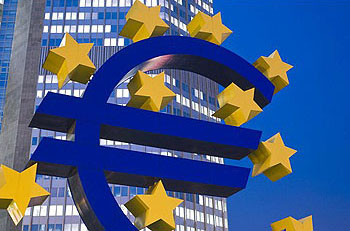Mario Draghi, head of the European Central Bank, has apparently decided to shore up Europe’s weak peripheral economies (Italy, Spain, Portugal) via large-scale purchases of their bonds. This should help to restore investor  confidence, prevent interest rates from spiraling out of control, and keep debt service levels tolerable in the affected countries. Dylan Matthews explains more:
confidence, prevent interest rates from spiraling out of control, and keep debt service levels tolerable in the affected countries. Dylan Matthews explains more:
Draghi is announcing his next move tomorrow, and sources inside the ECB say he’ll buy up unlimited amounts of Spanish and Italian debt. But there are catches….The biggest catch [] is that Draghi won’t buy up debt from countries that don’t abide by the euro zone’s new budget rules, which limit deficits to 3 percent of GDP, and “structural” deficits (that is, those not caused by lackluster growth) to 0.5 percent, or 1 percent for countries with a small debt burden. If states don’t meet those standards after he’s bought their debt, he’ll sell it. To be blunt: Spain is not going to meet those standards. This year, it’s on track for a 6.3 percent of GDP deficit, almost double the target. It must either start growing much faster, or institute draconian austerity measures that will cripple growth.
What the ECB is doing, in essence, is setting itself up as the shadow government of Italy, Spain, Portugal, and perhaps Ireland. If the governments of those countries do what Draghi wants, Draghi will provide them with generous subsidy. If the governments of those countries don’t do what Draghi wants, he’ll use a monetary laser to destroy their budgets. Fear will keep the peripheral states in line.
True enough. My only disagreement here is with the assumption that this is Draghi’s doing. The ECB is nominally independent, but in reality everyone knows that it lives and dies on sufferance of the German government. Draghi’s policy came about only after a great deal of backroom horsetrading, with the Germans eventually agreeing to it — or at least agreeing not to oppose it too strongly — only on condition that the target countries meet their austerity targets. This is indeed self-destructive, but if I had to guess, the real people to blame for this are Angela Merkel and Jens Weidmann, not Mario Draghi.

















